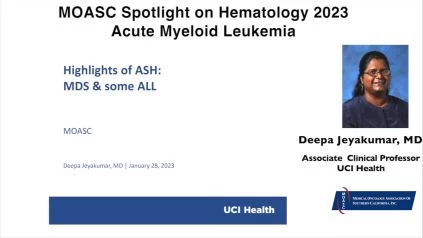Myelodysplastic Syndromes Treatment Update for 2023
By Deepa Jeyakumar, MD from UCI Health
I think what’s very exciting is that in the past year we’ve seen multiple different agents that are available for patients, giving them more options for these difficult to treat diseases in low risk MDs. We have seen the initial results. With a telomerase inhibitor, which will hopefully prove beneficial in patients with lower risk MDs and complete transfusion independence, patients can spend less time in the infusion centers getting blood transfusions and more time outliving their lives. In higher risk MDs, there are multiple different options that are proving to be very effective in controlling the disease, preventing the development of AML, and also normalizing blood counts so patients don’t have to get frequent blood transfusions. So I think that it’s an exciting time, and hopefully in the next few years there’ll be more novel therapies that will improve the lives of these patients.
What were some of the things that surprised you most about these studies?
I think that what is surprising is that these novel therapies can be given safely with minimal side effects and manageable side effects, if any. So I think that’s very promising. For a long time, we’ve had very few agents for these patients, so it’s a very encouraging time for patients.
Where do you think the MDS studies are going in the future?
So I think that with MDs, there are a lot of very exciting therapies that are probably going to get approved in the next few years and really transforming patients’ lives, giving them a better quality of life as well as controlling their diseases.
Watch and Share the Video with Slides Here: https://oncologytube.com/v/41751
Is there anything that you wanted to say in closing?
So especially in the high risk MDs patient population, for a long time we were using single agent Azacitidine or Decitabine. I think that there are now multiple different options that have very good results and are very tolerable. So it’s important to refer these patients for clinical trials, as well as, once they’re FDA approved, and using them safely.
Deepa Jeyakumar, MD – About The Author, Credentials, and Affiliations
Deepa Jeyakumar, MD is a board-certified hematologist-oncologist and Associate Professor at UCI Health who specializes in diagnosing and treating blood malignancies, bone marrow transplantation, and stem cell therapy. Her clinical focus is on the treatment of leukemias, lymphomas, myelodysplastic syndromes, and myelomas.
Philadelphia, Pennsylvania’s Lewis Katz School of Medicine at Temple University granted Dr. Jeyakumar her medical degree. She completed her internal medicine residency at the University of Illinois Medical Center in Chicago, then fellowships in hematology/oncology at Tufts Medical Center in Boston, Massachusetts, and bone marrow transplantation at Stanford University in Palo Alto, California.
She is the author or co-author of a number of publications, posters, and abstracts, as well as a chapter on acute myelogenous leukemia in a renowned book on cancer survivors’ care.

